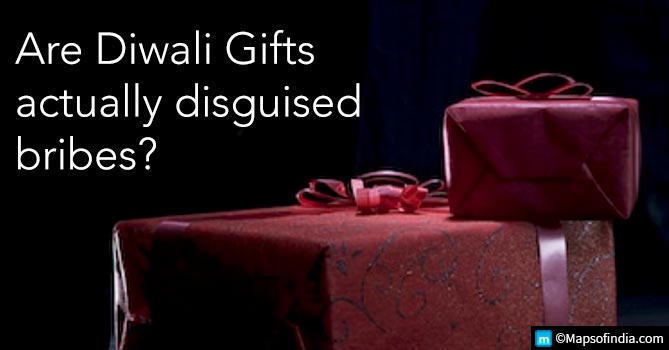
Ours has always been a country of festivities – one event barely goes by, and another comes rolling in. “Celebration”, in an aesthetic sense, is almost second-nature to us Indians. It is in these celebrations, that we usually exchange gifts, presents. No wonder then, that a festival as big as Diwali is donned with several gifts.
However, not all of the gifts are as ‘harmless’ as they seem. It is no hidden secret that in several office corridors- private or public, gifts are often exchanged not as a display of affection, but of subtle hints. Bribes have never really been a thing of the past in India- merely new ways of “favors” emerge. As Diwali comes around the corner, let’s look at the hidden side of these festivities.
How big is the issue?
On November 1 2018, the Directorate of Vigilance and Anti-corruption (DVAC) raided 24 places, confiscating Rs 44 lakh of bribe money ahead of Diwali celebrations in Chennai. “These officers were demanding bribe in the guise of Diwali gifts”, said a source. The raid came after about 150 petitions in the last one week itself. There were at least 50 alerts, either by informants or the public.
So, the cases of demanding bribes and favour granting aren’t just limited to the private sector. In fact, these bribes in the name of gifts are a very common sight in government office corridors. The cases increase even further at times of festivals like Diwali. The reason being, it is very common and acceptable to exchange presents on such occasions. However, the line between bribes and gifts is a thin one, indeed. The situation becomes more complicated because there are no laws putting down in concrete words what can precisely be termed as bribing. Here is how the regulations work:
Prevention and regulations
Self-imposed behavioral directives by companies and other organisations are usually included in the code of conduct for employees. In case of multinational companies, regulations mentioned in UK Bribery Act, US Foreign Corrupt Practices Act etc are followed.
When it comes to our own country, there is no law that directly controls and dictates the gift-giving practice. The Companies Act, 2013 or Securities and Exchange Board of India (SEBI)’s directives etc do not have rules that give clear instructions. They, however, mention an internal requirement to assure that there is no “misbehaviour” or “unethical” practices- which also includes improper gifts.
Prevention of Corruption Act, 1988
The closest our IPC comes to talk about what constitutes as a gift, and what as a bribe, is listed down in the Prevention of Corruption Act, 1988. The latest amendment in the Act was done in 2018.
So, how is it determined whether or not a gift to a government official is bribery?
The motive behind the gift is considered, since gifting is not outrightly illegal, according to the Indian Penal Code. The 2018 amendment sought to expand the horizon of the Prevention of Corruption Act, by including provisions even for the practice of “gift-giving”. Now, gifts received/ given with the intention of receiving an undue advantage will be treated as an act of corruption.
What is the punishment?
The amendment bill introduced an important change in the law. Now, bribe-givers, if found guilty, will receive the same amount of punishment as those who ask for bribes. Moreover, the punishment has also been increased. Earlier if a person was found guilty, they would be subjected to a prison term of minimum 6 months. Now, the minimum prison term has been increased to 3 years, extending up to 7 years, with a fine. For repeat offenders, the minimum prison term has been fixed at 5 years, extending up to 10 years.
In case of a coercive bribing, if the victim comes forward within 7 days, there is a provision for a protection blanket.
What about commercial organisations?
The Prevention of Corruption (Amendment) Bill, 2018 directs that the superiors in a commercial organisation if any employee has bribed a public servant following their approval.
An overview
As the season of festivities arrive, it is natural that both our personal and professional lives will be swarmed with presents. However, all essence of this practice seems lost as organisations resort to lavish gift-giving for ulterior motives. Over the years, it has become so normalised and important, that companies often spare a handsome amount from their budgets especially for this.
The professional world is competitive, yes. And, organisations strive to, and need to succeed. But, succumbing to bribes in the form of “hearty Diwali pleasantries” is certainly not the right way to head onto.




